The YA fantasy I grew up with had a paradox at its heart.
I wanted to be just like the heroes from these books, whose stories spoke to my experiences: feeling like I looked different than everyone else, like I didn’t fit in, knowing that my peers didn’t like or accept me, thinking that grown-ups couldn’t understand why I felt so isolated.
And yet I never once actually saw myself in these books. The heroes of these novels were invariably white, able-bodied, heterosexual, and cisgender. (Fortunately, this has started to change in the intervening years.)
They were also invariably thin. This has not changed very much at all.
The irony here is that the very reason I was so drawn to YA fantasy as a genre was because I was a fat child, who has since grown into a fat adult. I wanted desperately to believe that there could be a world, even an invented one, where the things that made me different could be okay, could even be good. If other people didn’t like or understand me, it was because they were close-minded or cruel. Being an outsider meant that I was a chosen Harry Potter, and everyone who picked on me was an unmagical Dursley. I was a brave Katniss, while the classmates who bullied me were the shallow and vicious denizens of the Capital. I was a clever Tiffany Aching, saving the world on behalf of ungrateful parents and teachers too caught up in their own normalcy to see how important I was.
I was like these characters, because they were outsiders in a world that could not understand what made them special, and so was I. They felt lonely, the way I did. They even obsessed about looking different from everyone around them, as I did (consider the quantity of YA fantasy heroines who are insecure about being the only brown-haired girl among blonde siblings!) But I was also not like these characters, because, unlike any of them, I was Jewish, and queer even if I didn’t know it yet, and chronically ill, and fat. So as I read these books, again and again, I got the message: here, too, I was not wanted. Even in a made-up world, where dragons soared through the skies and magic was an everyday occurrence, no one could imagine anything as absurd as someone like me being a hero.
That’s putting it a little bit dramatically, of course. (Forgive me. I’m a writer, it’s my job). In fact, matters are improving in representation in books across the board. Publishing has made a strong push towards diversity and inclusion in recent years, with movements like We Need Diverse Books and the call for #ownvoices spurring some much-needed changes. Yet these changes aren’t enough, leaving out many marginalized groups, including fat people. (I use the word fat here, and throughout the essay, because it is my preferred term and the one most commonly used in the fat liberation movement). Fat protagonists, especially in YA fantasy, are still few and far between, and unfortunately many of the portrayals of fat characters fall far short of providing positive representation for the many readers longing for it.
For readers looking for fat representation in YA fantasy, I wish I had better recommendations to offer after a lifetime of searching. Here are a few, most with caveats:
Nina from Six of Crows by Leigh Bardugo

The author has confirmed that she intended this character to be “chubby” and self-describes as fat, making this a rare example of an #ownvoices fat character in a bestselling YA series. Nina is, in many ways, wonderful representation for fantasy readers looking for fat characters. She is bold, confident, and loyal. She is also seen as charming and attractive, a rare thing for a fat character in any media. Unfortunately, Nina’s fatness has been erased in the recent Netflix adaptation of Bardugo’s works, Shadow and Bone, where she is played by Danielle Galligan, a thin actress. For me, the erasure of one of the few fat fantasy protagonists we have is enough to make me not want to watch the show, so I can’t comment on it beyond my disappointment that Nina’s fatness didn’t make it into the show. If there are few fat characters in fantasy books, there are even fewer in fantasy shows and movies, and it really saddens me that this adaptation squandered a chance to do something really radical in Nina’s representation. That said, the books still stand as a great example of truly inclusive fat representation in YA fantasy.
Trisana Chandler from Tamora Pierce’s Emelan series
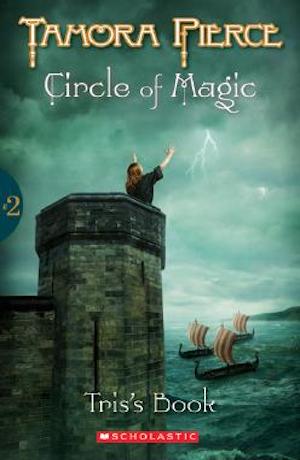
Tris is one of the four heroes of Tamora Pierce’s Emelan books, which begins with the Winding Circle quartet. These books tell the story of four young mages whose magical powers manifest in unusual ways (Tris’s powers are based on the weather), who find a family in each other as they learn to control and eventually master their magic. Each of the four protagonists has their own book and their own challenges fitting in. Tris is short-tempered, enormously magically powerful, and ferociously intelligent. A well-rounded, narratively-developed, indisputably heroic main character, she is also fat. Her books give a heart-wrenchingly relatable account of what it’s like to grow up as a fat girl. Other children bully her by calling her “fatty,” her family only gives her clothes that are too small for her body, and she is plagued by insecurity about many things, including her looks. Tris’s story can’t offer readers an escape from fat-shaming, but she is a true fat YA fantasy hero. (Tamora Pierce’s other books also offer a wealth of body-diverse characters, like the broad-shouldered, tall Keladry of Mindelan, who have to overcome stigma about how they look in order to embrace their heroic destinies).
Aza in Gail Carson Levine’s Fairest
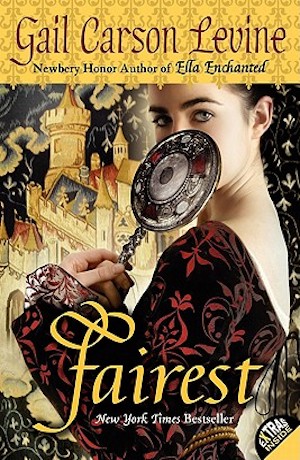
In this companion novel to her celebrated Ella Enchanted, Gail Carson Levine retells the Sleeping Beauty myth with a heroine who, despite her beautiful singing voice, kindness, and devotion to her family, despises herself because she is ugly. Specifically, she describes herself as being “doughy” and “broad as the corridor”. She’s called “prodigious” and “vast,” with a waist like a “tree-trunk”. I also resonated with the way she constantly compares herself to other women, thinking of them as smaller, more delicate, and therefore more worthy. It’s lovely to see a truly compassionate character like Aza depicted as fat. However, there are also some things about the depiction of fatness in Fairest that might be hurtful. Fatness is conflated with ugliness, and Aza is mistreated for both. She is magically transformed into a beauty over the course of the book, which explicitly makes her smaller. That said, she also has a prince who adores her—specifically, who “loved her size from the first”, and comes to understand how painful and destructive the quest for beauty, and thinness, can be. Given how central the fairytale love of the beautiful princess and handsome prince are to our cultural ideals, Carson’s choice to give a fat heroine the role of the “fairest of them all” is pretty radical.
Cora from Beneath the Sugar Sky by Seanan McGuire
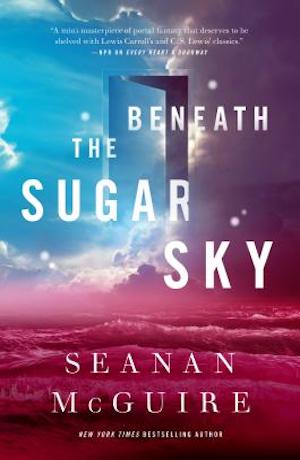
Seanan McGuire is renowned in fantasy circles for her radical choice to directly name the identities of her characters, and Cora, the hero of Beneath the Sugar Sky, is no exception. Cora describes herself as fat in the very first chapter, recounting how she was taught by a lifetime of mistreatment to hate her own body—and the surprising wonder of finding herself in a new world where no one mocks her for being fat. McGuire perfectly depicts many of the experiences of growing up as a fat child: others assuming that Cora is lazy or unhealthy, Cora’s fear of eating in front of other people who might mock her, even the way others encouraged her to diet to the point of disordered eating. I’ve never seen these experiences represented in a fantasy book before. What’s more, the whole series that Beneath the Sugar Sky is part of seems to be built around solving the very problem I introduced at the beginning of this essay: in this world, part of what makes the series’ titular “wayward children” leave their own worlds for fantastic adventures in others is the fact that they don’t fit in at home—because of their sexual orientation, their gender identity, their disabilities, or because, like Cora, they are fat. Although, like most of the other characters on this list, Cora’s story revolves around the fat-shaming she experiences from others and from herself, she also provides exactly what I felt I was missing as a young adult reader myself: a fat character whose fatness makes her different, and whose differentness makes her a hero.
The hopeful news I can offer is that this is starting to change. Most of the books on that list are fairly recent. As the push for increased diversity in fiction meets the growing body positivity movement, I think there will be more and more YA novels with fat protagonists. I’m excited for Sarah Hollowell’s A Dark and Starless Forest, for example—although I haven’t read it yet (it’s not out until September) it has a fat protagonist right on the cover. So does H.E. Edgmon’s soon-to-be-released The Witch King, which I’m also looking forward to for queer and trans representation.
My own upcoming debut novel, Queen of All, has two fat protagonists. Sisi is a beauty, self-confident and headstrong. Jena, the narrator, on the other hand, is self-conscious, anxious, and shy. I’ve tried to bridge some of the gaps in fat representation with this book, just as I know many of my fellow authors have in the books above and in others. I’m also sure I’ve gotten things wrong, and that parts of the representation in Queen of All may end up feeling more hurtful than helpful. Some readers might wish for a book where Jena’s weight isn’t part of her struggle with self-esteem. Others might feel like, because Sisi is admired as a beauty, their experiences of being shamed for their fatness are erased.
There is still so much missing. Where are the fat protagonists who unapologetically love themselves, who are admired instead of shamed? Where are the big-budget TV and film adaptations with fat characters at the center? Where are the fat protagonists who are also Black, trans, physically disabled, bisexual, Native, and so many more intersectionalities of experience? A handful of books can’t solve the paradox of YA fantasy’s exclusion of the readers who need it most. My one book certainly can’t.
However, as more authors dare to put fat characters at the center of fantasy stories—and as readers encourage us by supporting them—we can, together, change the story we are telling young readers. Considering the pervasiveness and cruelty of fatphobia, young readers deserve to be able to escape into fantasy, and to see themselves belonging in the stories they love.
Buy the Book
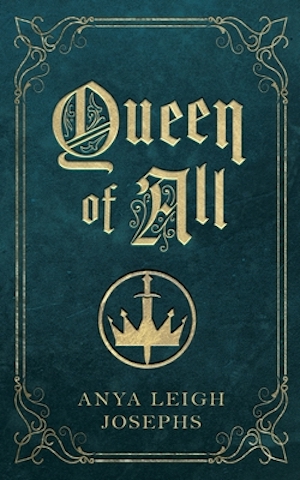

Queen of All
Anya Josephs was raised in North Carolina and is now pursuing a career in social work in New York City. When not working or writing, Anya can be found seeing a lot of plays, reading doorstopper fantasy novels, or worshipping their cat, Sycorax. Anya’s short fiction can be found in Fantasy Magazine, Andromeda Spaceways Magazine, and Mythaxis, among many others. Their debut novel, Queen of All, is an inclusive adventure fantasy for young adults available now.










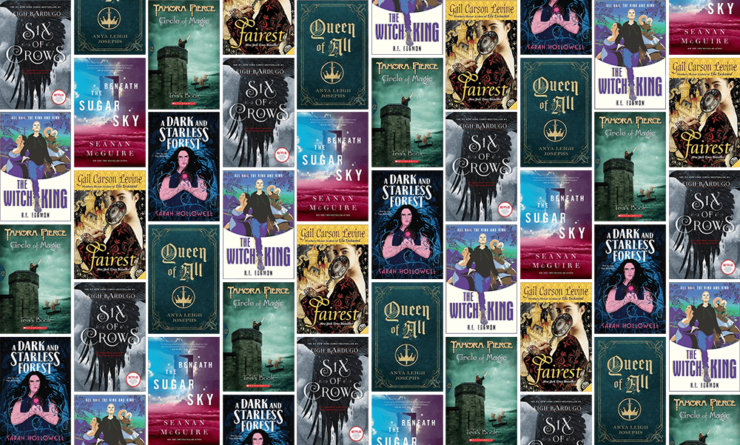
Have your read a firstful of sky by NIna kiriki hoffman?
Princess Elisa of “The Girl of Fire and Thorns” trilogy by Rae Carson is very definitely fat, and deals with a lot of flak for it. Never mind that she’s a princess and was absolutely 100% chosen by her god, she is still forced to struggle with her self-esteem and people underestimating her.
Breeze in Mistborn is a great character…. although he isn’t technically a main character like Vin or Kelsier.
It’s out of print, but Such a Pretty Face, edited by Lee Martindale, is a fat-positive collection. https://smile.amazon.com/Such-Pretty-Face-Gene-Wolfe/dp/1892065274/
The Flora Segunda trilogy by Ysabeau Wilce has a chubby redhead female protagonist. I think it is a grossly underappreciated series with very rich worldbuilding and great adventures.
Nan Pilgrim in Witch Week (a stand-alone in the Chronicles of Chrestomanci) by Diana Wynne Jones. She’s bullied by the other girls at her school for being fat, although the worst of the bullying is for being suspected of witchcraft. She’s one of the two main characters, and proves herself to be smart, imaginative, stubborn, resourceful, and is largely responsible for saving everyone at the end. This was first published in the 1980s, but I think it’s still in print.
Yes, it’s also difficult for fat queer boys who want to find stories about boys like them. Some recommendations:
Cub by award-winning author Jeff Mann is about a heavy-set teenage boy who starts to navigate his homosexuality and entrance into the Bear community.
Fruit by Brian Francis is a humorous novel about a heavy-set boy with talking nipples.
Not YA but still wonderful (I’m biased with one…)
Fat and Queer a new anthology edited by Miguel M. Morales and Bruce Owens Grimm (a book that covers the spectrum of LGBTQ)
Burly Tales edited by yours truly, an anthology about fat and hairy men having adventures and romance–the stories are fairy tale retellings.
Not a YA book, but a comic: thought I’d mention the 2016/17 series “Faith” with its fat female superhero. Wikipedia claims that in June 2018 Sony announced a coming film adaptation. I suppose it’s possible that’s still in the works, pandemic-delayed.
I always appreciate articles like this because the comments are invariably filled with helpful suggestions for further reading.
I don’t need to see myself in books. Frankly, I know my experiences and would rather see those of others to better understand them. It’s what drew me to sff, the opportunity to put myself into the shoes of beings who are very other.
What I do want, however, is realistic depiction of my traits if they appear in books. I don’t want to see a book where fat is shorthand for lazy and despicable, or scientist for evil megalomaniac, or nerd for dateless antisocial friend who can hack anything. That’s hack writing, but I see it all too often even by the best of writers.
In Arkady Martine’s book A Desolation Called Peace, there is one of the main characters is a fat woman who is a very respected military leader, and her fatness is not a plot point or remarked on other than as part of her physical description (which doesn’t call it a negative or positive trait). So refreshing!
Karen Healey’s Guardian of the Dead has a fat protagonist. And really creepy faeries from Maori mythology.
You mentioned Tiffany Aching, who fits the YA hero mold, but Pratchett’s Discworld is also filled with self accepting heavy adults, most notably Nanny Ogg.
Not a book but a movie (that I’ve read about but not seen) is Melissa McCarthy tOctavia Spencer in ‘Thunder Force’.
Not fantasy, but the delightful alternative history novella River of Teeth and its sequel, Taste of Marrow, feature Regina Archambault, a charming thief and con artist. The first line about her is “Nobody ever suspects the fat lady.”
Honestly, I felt like the series really hit it out of the park with representation, since there are characters of color, queer characters (including a nonbinary character!) and a fat character. It’s also about people raising hippos as livestock in Louisiana in the 1890s, which is a level of weird that I enjoyed immensely.
@1 – That was my first thought also. It would answer Josephs’ point about “I’ve never seen these experiences represented in a fantasy book before” quite well. That said, the book is probably triggering for people who were bullied for their weight or who have/had eating disorders. It’s disturbing even for those who have not.
While not YA, in Bujold’s Mirror Dance Mark eventually comes to deliberately choose a body type considerably fatter than Miles, whom he is a clone of, as a way to assert a separate identity and control over his own body after a lifetime of being manipulated to physically resemble Miles.
Given some of the other topics the book covers (including torture, and discussion of both Mark being starved to remain as thin as Miles in his past, and force-fed as a form of torture for part of the book) I’m not sure I’d point a younger YA reader to it, but for someone looking for a story of embracing your own body for what it is instead of what others want it to be, it is an interesting take on the matter.
I came to mention Princess Elisa from “The Girl of Fire and Thorns” trilogy by Rae Carson, and found it was already the second comment here. I wanted to add that I was particularly impressed with the writing of that character, because I thought it dealt with her complex internal psychology about body shape and eating more deftly than anywhere else I’ve personally seen the issue handled in SFF literature. It was certainly much more than I expected from most YA, which I don’t necessarily mean as a criticism of YA. It’s just that YA SFF is typically driven by fast-moving adventure plot that must fit into a pretty merciless page count, and so YA writers often end up drawing character development by in pretty broad strokes.
Rae Carson brings insight from her personal experience with body and food issues to her writing, and it shows. Elisa’s negative feelings about her body have complex ties to her insecurities and anger about her overall capabilities, her value as a person, member of her family, and wife; and her objectification and obligations as a woman, religious idol, and political pawn. Her relationship with her body evolves in tandem with these other aspects of her psychology over a character arc that spans the whole trilogy. Additionally, the books handle the experience of emotional eating with thoughtful realism. Elisa has a joyous, body-inhabiting appreciation of good food that can suddenly transform into grimly ashamed, disconnected, compulsive binging in the face of wounded feelings, guilt, and anxious self doubts.
Finally, it’s worth noting that Elisa loses weight through forced deprivation and exercise during part of the story, and that her physical transformation does play a part in changing how she feels about herself, but that she is ultimately comfortable with her body when she eventually gains weight back again. In other words, it is NOT one of those obnoxious representations where it’s implied (or stated outright) that once a character gets over their psychological issues and starts believing in themselves, then they can be thin, because being fat was really just a manifestation of a mental problem. Instead, she’s a woman who makes friends with her body in part by discovering that it has the capacity for more strength and endurance than she believed, and she continues to stay friends with it when her weight returns to its typical steady state in the regain that is practically universal after weight loss.
Simple representation is great, and I agree that it’s nice to also see characters where their fat or other body shape is just a feature, not a plot point, or imagined worlds that simply don’t have some sort of prejudice that we struggle with. However, I also think a hugely important part of representation is having stories that address the emotional experiences and internal lives of people whose identities are marginalized in our current reality, and Carson does a truly excellent job of that.
There’s a series of YA books written by Julie Murphy that all have fat protagonists, many of whom are gay or bisexual or somewhere on the LGBTQ spectrum. The books start with Dumplin’ and go on to Puddin’ and on to the latest, Pumpkin, about a gay teenage boy who longs to be a drag queen. These books are so well written that I was engrossed from the first page on, and found myself finishing the novel within a day. Highly recommend!
I would also say that short men are under represented, no matter what “race” they are. This was always particularly troubling for me. Don’t get me wrong, Rand al’Thor was and always will be a literary hero for me, but its always disappointing to hear how height is equated with power, strength, or ability. When in reality, height has nothing to do with your mental or physical strength in the end. I mean, I enjoyed Tyrion Lannister as a character of course, but it would be pleasant to see just a short guy with nothing physically wrong with him, be in a position to be the hero (or at least not a villain). We also have a need for relationships to reflect reality. As in a short guy with a tall girl, for example. Otherwise, it is just a perpetuation of more stereotypes such as that in a heterosexual relationship, a man needs to tower over a woman. For that matter, there are very few examples of larger women as normal protagonists in the genre. This is a good thread, and I agree that we need so many more body types, backgrounds, cultures, and experiences in our literature.
Not a YA, but Kip from Brent Weeks’ Lightbringer Series is definitely fat. He does get into shape over the course of the series, but he’s still quite large.
Alex@18,
Just came to the comments for the same reason you did and would like to second every single thing you said.
Have we all forgotten Molly Weasley? Yes, she’s treated as rather a stereotype, but a Really Scary One during the Battle of Hogwarts. Even the twins are respectful (well, mostly).
@22 I thought of Kip, but rather as a terrible representation. I haven’t read all the books in the series (DNFed book two precisely because I couldn’t take the fat shaming anymore, especially in his inner dialogue). I asked people who read all the way through the series and heard it doesn’t get better, and the “solution” is weight loss (please tell me if it’s not the case).
Not SFF at all, but I loved I’ll Be the One, by Lyla Lee (YA contemporary). Such a story of empowerment in a character who has a great notion of her worth from the beginning.
Nimona by Noelle Stevenson. A fantastic titular character who chooses a fat body and a queer-coded human appearance (she’s a shapeshifter).
Fairest is a favourite, but the thin, conventionally attractive model on the cover has long bothered me.